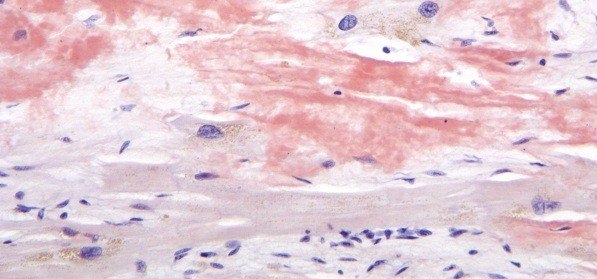Amyloidosis

Description
Amyloidosis is a rare disease that develops when a substance called amyloid builds up in the body’s organs.
Amyloid is an abnormal heterogeneous protein that is normally produced in the bone marrow and can begin to deposit in any tissue or organ.
The disease can affect different and there are also different types of the deposited substance.
The clinical condition most commonly affects the heart, kidneys, liver, spleen, nervous system and gastrointestinal tract.
The severe form of the disease can lead to life-threatening organ failure.
What are the symptoms?
The disease is asymptomatic until it enters a more advanced stage. When clinical manifestations occur, they depend on which organs are affected.
Signs and symptoms may be:
• Swelling of the ankles of the feet;
• Severe fatigue and weakness;
• Shortness of breath;
• Stiffness, numbness or pain in the hands or feet, more often pain occurs in the wrist /carpal tunnel syndrome/;
• Diarrhea, as it is possible to detect the presence of blood or constipation in the stool;
• A feeling of swelling when eating, as well as significant weight loss;
• Enlarged tongue;
• Skin changes such as thickening or easy bruising and the appearance of purple spots around the eyes;
• Irregular heartbeat;
See your doctor if you consistently experience any of the above symptoms.
What are the causes?
There are several varieties of the disease:
• The most common type is the primary form, which is caused by an immunoglobulin light chain. It develops when the bone marrow produces abnormal antibodies that cannot be destroyed and are deposited in the tissues as amyloids and disrupt their normal function.
• The secondary form, occurring in about 3% of cases of the disease, is caused by acute phase protein or amyloid A.
The kidneys are mainly affected, but sometimes deposits can also appear in the digestive tract, liver and heart.
It develops most often in people with chronic infectious or inflammatory diseases such as rheumatoid arthritis or inflammatory bowel disease.
• Hereditary form – mainly affects the liver, nerves, heart and kidneys and is caused by amyloid, which is a mutated transthyretin.
• Dialysis-associated form of the disease – develops when the blood protein beta 2 microglobulin is deposited in the joints and tendons and causes pain, stiffness and fluid in the joints, as well as carpal tunnel syndrome channel.
This form of the disease affects people who are on chronodialysis and in most cases develops 8-12 years after starting dialysis procedures.
Treatment of amyloidosis
For the primary form of the disease, chemotherapy is given to stop the growth of the abnormal cells from which the amyloid is formed.
Before starting the cycle of therapy, a peripheral blood stem cell transplant is performed and stored briefly until the end of the cycle or at least the period in which the largest doses of medication are administered.
This treatment is best suited for people whose disease is not advanced and whose heart is not severely affected.
Treatment of other forms of the disease
• The secondary form – drug therapy is mainly used, for example an anti-inflammatory drug to treat rheumatoid arthritis;
• Hereditary form – a liver transplant may be considered as a treatment option, as the protein that causes it is produced in the liver cells.
• The dialysis-associated form – the options are a change in the dialysis regime or with a kidney transplant.



